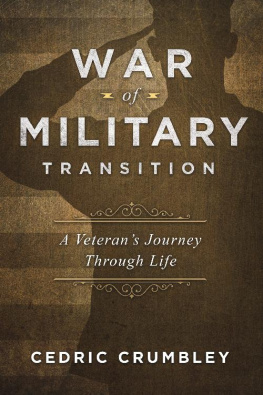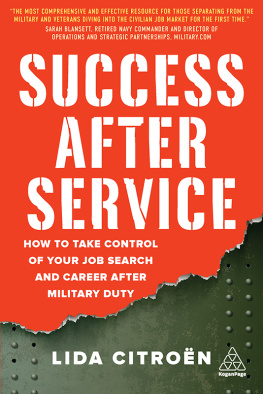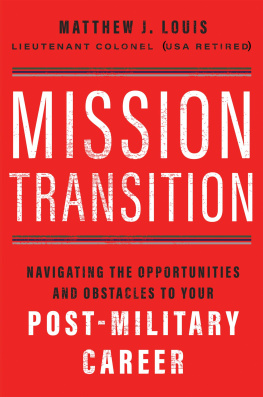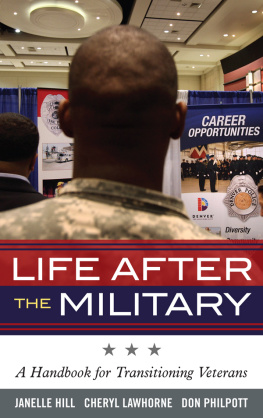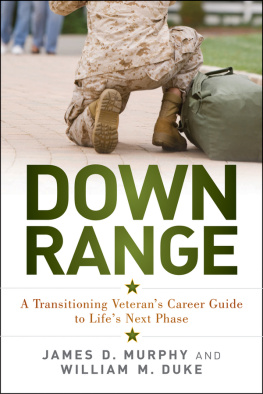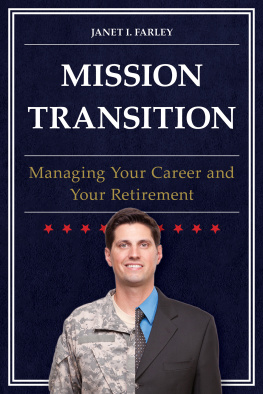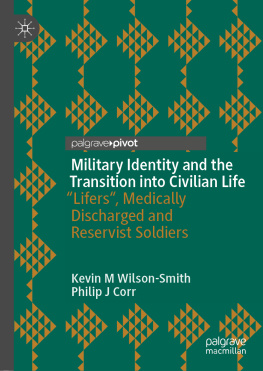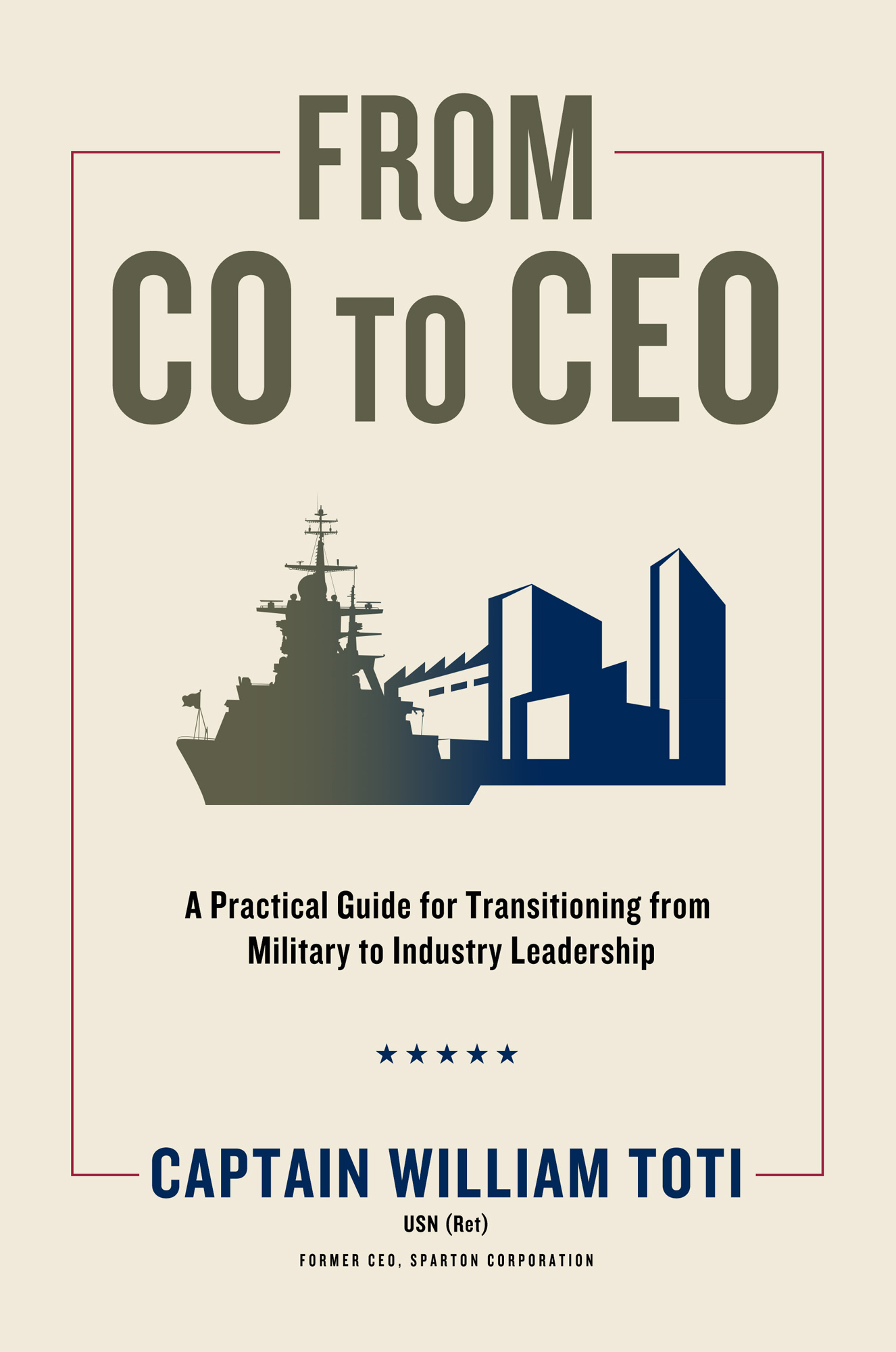Contents
Guide
From CO to CEO
A Practical Guide for Transitioning from Military to Industry Leadership
Captain William Toti
USN (Ret)
Former CEO, Sparton Corporation
To the men and women who get it done in the fields, seas, and skies of battle and in the industries and factories that support them.

Foreword
T he United States remains the worlds premier superpower, and I believe this status is directly attributable to our nations core belief in life, liberty, and the pursuit of happiness.
Our national values provide the moral underpinning for our forward presence around the world, from our embassies to our military forces. They define us as a great nation with a willingness to use our most valuable assetsour people in uniform and at our embassiesto protect, defend, and fight with and for our allies and partners who believe in and are governed by these same principles.
The US defense industry provides the critical enabler in fulfilling our national security through military strength in concert with our political and economic tools of national power.
This industry is a complex and challenging environment that demands the best and brightest talent to ensure we maintain our technological and competitive advantage over all our peer competitors and those who would wish us harm. The workforce necessary to drive this endeavor includes our most skilled engineers, career defense industry professionals, and a plethora of military-experienced people (many retired from the uniformed services) who understand the operational art of war and the application of a wide variety of products necessary to win in any environment.
Bill Totis book is a testament to understanding that interrelationship, and while useful for all servicemen and servicewomen as they transition from active duty, it is a must-read for those thinking of joining and, just as importantly, for those who are already part of this business of the defense of the United States.
V ICE A DM . R OBERT S. H ARWARD, USN (R ET ) SEAL

INTRODUCTION Pivoting Toward Your Future
I f youre reading this book, youre likely thinking about leaving military service for a civilian career either because its your choice or because circumstances are dictating a move for you.
Whatever the reasons, youve faithfully served your country, and now you have the opportunity to begin a second career. This is a pivotal point, a once-in-a-lifetime milestone. Even if you are retiring after twenty years of service, there is a good chance your second career will last as long as your first. A good chance, too, it can become as meaningful and rewarding.
During my past fifteen years in industry, Ive counseled hundreds of people transitioning from military to civilian roles. And in that time Ive noticed a troubling pattern of smart people making avoidable mistakes. Your military servicein my case, the Navywill do their best to assist your transition by inviting you to one or more transition assistance courses. Unfortunately, these courses are often examples of the blind leading the blind, with instructors who have little or no critical experience in industry parsing out profoundly bad advice. And so a recent survey found that only 29 percent of transitioned special operations forces considered their transition assistance course helpful. indicating their transition course did not properly prepare them for the journey. This is a travesty.
In fact, the worst advice I received pertaining to my transition was doled out during one of those classes.
The year was 2006. I had just completed more than two and a half very rewarding decades on active duty. I had served as commanding officer (CO) of a submarine and as commodore of a submarine squadron, followed by what the Navy refers to as sequential major command. By this time, I was ready for new opportunities.
Thats when the instructor in my transition-assistance course told my class full of similarly transitioning military leaders, All your future employer wants from you is good leadership.
Everyone in the class nodded, their preconceived notions reinforced.
The instructor continued, Youve succeeded at senior levels in the military, so all you need to do now is leverage that experience to succeed in civilian life.
We reacted very well to this apparent validation too. He had shared two nuggets of welcome wisdom in just two sentences. We sensed that we were indeed special. Poised for automatic success.
But what a crock that was.
Sure, industry bosses want good leadership from their transitioning military folks. But that is far from all they want. Think about it. How much can leadership in one system corollate to leadership in an entirely different one? Turns out, its not as much as one might wish.
And, sure, your experience defending your country adds value to your rsum. But leveraging it in todays business climate is definitely not all you need to do to succeed.
For me that bad advice turned out to be transition challenge number one. Misstatements like these create false impressions among transitioning veterans. When reality hits them in the civilian job market, its no wonder nearly half find it more challenging than they expected.
And then there was the company that hired me. They knew from my operational experience I had some background in material acquisition, so they assumed Id understand how such transactions in an actual business operated.
Boy, were they wrong. That was transition challenge number two.
The truth is, I made the move into industry not knowing what I was getting myself into and what would really be expected of me. Since then, Ive learned the vast majority of others making the same career move dont have a clue either. The only reason I survived that first job was because both my employer and I quickly recognized our misalignment and took the necessary steps to correct the situation.
I am one of the lucky ones. Sad to say, Ive heard many tales of woe from fellow veterans who didnt fare so well. Within a year or two they gave up on their dream of drawing from their military experience to fuel a fulfilling career in business and industry, opting instead to leave their first civilian job to do something else entirely.
Others selected a good first job but remained stuck there for the next twenty years.
Or they started counting the hours until they could manage to retire a second time.
Or they bought into a burger franchise.
Or they went golfing while their spouses hit the job market.
Then there were those who went back to school to find something else they might be good at, pushing their peak earning years out into infinity.
Which leads to the question: how did so many smart and experienced people working diligently to make a successful transition fail at this goal?
Obstructing the Flow
Looking back, I see two main culprits. First, the instructor teaching my course had essentially no relevant corporate experience himself. More than likely it was because the contract for our transition training had been awarded to the lowest bidder.
For now, lets identify failure to present the business world accurately as Culprit #1, and I promise to reveal more on how service contracts are awarded later in this book.


